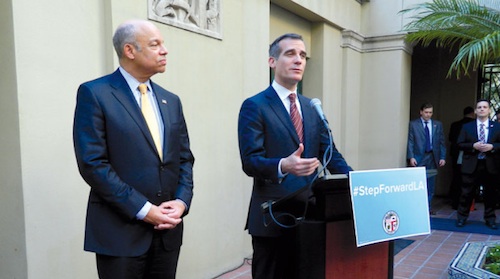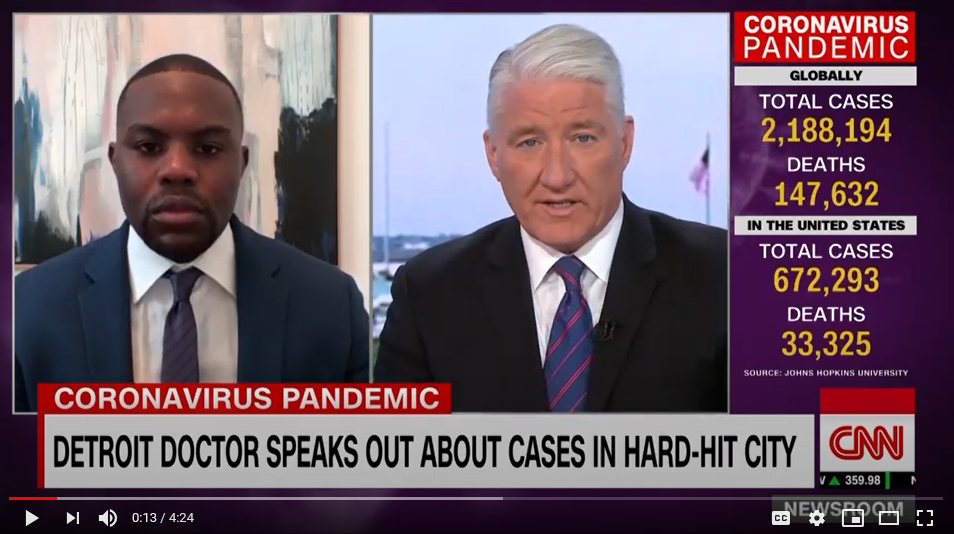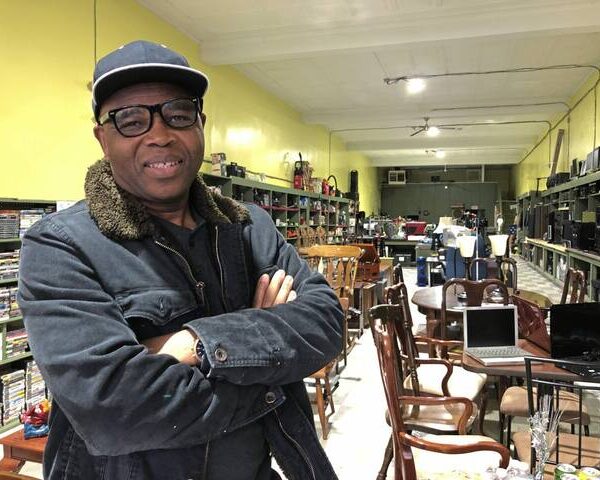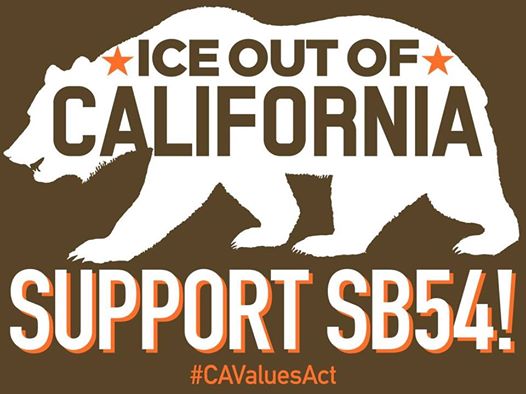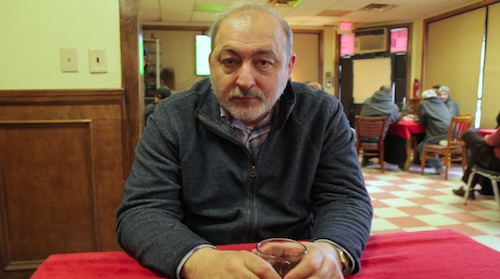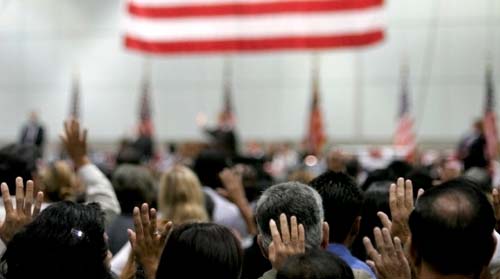LOS ANGELES – Since President Barack Obama announced his executive action on immigration last November, hundreds of departments and organizations have been gearing up to implement the plans that are estimated to affect millions of undocumented residents living in the United States.
Federal agencies such as the United States Citizenship and Immigration Services (USCIS) and the Department of Homeland Security (DHS) have been working with the Obama administration, as well as both chambers of Congress, to talk about the program and gather the details of the new immigration policies being carried out over the next few months. “One of the things we know from history is that generation after generation of immigrants have struggled to be a part of the American experience—people like my own ancestors,” said DHS Secretary Jeh Johnson at a public information session held Feb. 12 at the Los Angeles Central Library. “But we have also overcome.”
The President’s actions would ensure that enforcement and removal policies will continue to prioritize threats to national security, public safety and border security through the USCIS; broaden business opportunities, expand deferment for eligible individuals in existing and new programs, and generally increase access to US citizenship for people who are qualified.
“I believe that in God’s earth, there are no second-class people,” the secretary said to rounds of cheery applause.
The two main initiatives for executive immigration reform are the expansion of Deferred Action for Childhood Arrivals (DACA), and the implementation of Deferred Action for Parent Arrivals (DAPA).
Changes to the original DACA program, first introduced in 2012, include an expansion to young people who came to the US before they turned 16, removal of the upper age cap (from Jan. 1, 2010), and a longer period of authorization from two to three years. Individuals who meet these and other requirements will be eligible to apply for the program.
“This is an exciting moment in history, that we are amending the criteria for DACA,” Johnson said. “There are many wonderful examples throughout this country of the recipients and beneficiaries of this program, and the DHS is grateful for the tremendous amount of support.” The launching of DACA and open applications are expected to be out by Feb. 18.
The new DAPA program will allow the parents of a US citizen or legal permanent resident to remain in the country and apply for work authorization for up to three years, should they meet requirements and background checks. If an applicant has lived in the US for at least five years, has committed no serious crime, and is the parent of a citizen or legal resident, he or she is eligible for DAPA. The program—which will consider an estimated 4 million—is still in its early planning stages, and is expected to be running by May or June. Los Angeles Mayor Eric Garcetti also spoke at the event, addressing a crowd of hundreds including non-profits, media, and even several undocumented immigrant families who are eligible for the programs. “
Los Angeles in 2015 is like Selma in 1964,” the Mayor opened his remarks. “There are 550,000 Americans living in the shadows who want to come out and be a part of this society, and contribute to its economics, livelihood, and future. Los Angeles is a city founded on immigrants. We want to help you settle into these communities that you already call home.”
Mayor Garcetti promised to work alongside the DHS and use the city’s many resources to see immigration reform move through with success, and for DACA and DAPA to be “stepping stones” for other programs of “greater integration” in areas such as improved health care, citizenship courses, driver’s licenses, tax assistances, and other ways to improve immigrants’ quality of life in the US. “The most important message of today is don’t be afraid,” he stressed.
Garcetti introduced the Step Forward LA initiative, promising that the Mayor’s Office would readily assist immigrants looking to apply for the new programs as soon as they become available. “Because all Americans, not just immigrants, benefits from this action, and everybody deserves a chance to step forward,” he said.
He also introduced a DACA recipient, Maria Gomez, who graduated with a Master’s in Architecture from University of California, Los Angeles and spoke about how the program has changed her life.
“The guarantee of not being deported from this country has changed my life,” Maria shared tearfully. “DACA has given me all of these opportunities to continue here, and it is no longer just about surviving, but I am focused on thriving.”
“This is about our fellow human beings,” Garcetti said. “We have an opportunity to boost our economy, make our streets safer, and to strengthen the social fabric of this entire country, specifically here in Los Angeles, where 60 percent of our population are immigrants.”
“Executive action is the greatest promise for this city, of any city in America,” he finished.
DHS addresses temporary protected status for Filipinos
In a press briefing following the formal address, Secretary Johnson was asked about the White House agenda for Temporary Protected Status, or TPS, for Filipino families affected by super typhoon Haiyan in 2013. TPS would allow protected coverage to Filipinos temporarily staying in the US to legally work to financially help their afflicted countrymen in times of hardship.
“It has been over 450 days since Typhoon Haiyan,” said Justice for Filipino Americans (JFAV) coordinator Arturo Garcia to the DHS Secretary. “Why has the Obama administration not approved TPS for the Philippines?”
“It’s something we’re considering,” Johnson simply replied, as Mayor Garcetti chimed in, “TPS is something we have on record the city of LA has been strongly supporting.”
No final action or decision has yet been made on TPS, as the Philippine government continues to wait over a year later.
In a recent letter to the White House, Filipino American Community of Los Angeles (FACLA) President Austin Baul made the plea for justice directly to President Obama: “I’m writing you, Mr. President, to tell you that the US refusal on the Philippines’ request for TPS is not an act of a friend. I hope you understand the sincerity of the Philippines’ friendship. For the sake of the US-Philippines friendship, for the sake of millions of afflicted Filipinos, please grant the TPS now.”
Obama’s response to the request made in December was short and to the point: “I want you to know that when you send me a letter, I am listening. I will keep treating the cares and concerns of people like you as my own, and I will keep fighting to restore the American dream for everybody who is willing to work for it.” Pilipino Workers Center (PWC) activists were also present at the event, demanding that Secretary Johnson and the DHS hear the plea for TPS.
“Millions of Filipinos are waiting! Our community has not forgotten about the millions affected who are still waiting for relief!” the group posted on their official Facebook page, along with a link to sign their petition. “461 days have passed since Yolanda. Jeh Johnson can’t keep our community waiting anymore!”
PWC is also offering free guided informational workshops and in-language assistance to help those applying or renewing their status for the expanded programs. In the meantime, undocumented immigrants eligible to apply for either of the DACA or DAPA programs are encouraged to gather necessary documents, attend educational workshops, and get the help they need from trusted sources like the USCIS government website, not immigration scammers who charge fees.
“Energized, terrific programs like Step Forward LA are what this country needs,” Johnson said.

